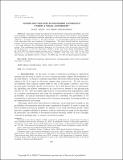Lower Bounds for Randomized Consensus under a Weak Adversary
Author(s)
Attiya, Hagit; Censor-Hillel, Keren
DownloadAttiya-2010-LOWER BOUNDS FOR RANDOMIZED CONSENSUS UNDER A WEAK ADVERSARY.pdf (272.6Kb)
PUBLISHER_POLICY
Publisher Policy
Article is made available in accordance with the publisher's policy and may be subject to US copyright law. Please refer to the publisher's site for terms of use.
Terms of use
Metadata
Show full item recordAbstract
This paper studies the inherent trade-off between termination probability and total step complexity of randomized consensus algorithms. It shows that for every integer $k$, the probability that an $f$-resilient randomized consensus algorithm of $n$ processes does not terminate with agreement within $k(n-f)$ steps is at least $\frac{1}{c^k}$, for some constant $c$. A corresponding result is proved for Monte-Carlo algorithms that may terminate in disagreement. The lower bound holds for asynchronous systems, where processes communicate either by message passing or through shared memory, under a very weak adversary that determines the schedule in advance, without observing the algorithm's actions. This complements algorithms of Kapron et al. [Proceedings of the Nineteenth Annual ACM-SIAM Symposium on Discrete Algorithms (SODA), ACM, New York, SIAM, Philadelphia, 2008, pp. 1038–1047] for message-passing systems, and of Aumann [Proceedings of the 16th Annual ACM Symposium on Principles of Distributed Computing (PODC), ACM, New York, 1997, pp. 209–218] and Aumann and Bender [Distrib. Comput., 17 (2005), pp. 191–207] for shared-memory systems.
Date issued
2010-12Department
Massachusetts Institute of Technology. Computer Science and Artificial Intelligence LaboratoryJournal
SIAM Journal on Computing
Publisher
Society for Industrial and Applied Mathematics
Citation
Attiya, Hagit, and Keren Censor-Hillel. “Lower Bounds for Randomized Consensus Under a Weak Adversary.” SIAM Journal on Computing 39.8 (2010) : 3885. © 2010 Society for Industrial and Applied Mathematics.
Version: Final published version
ISSN
1095-7111
0097-5397